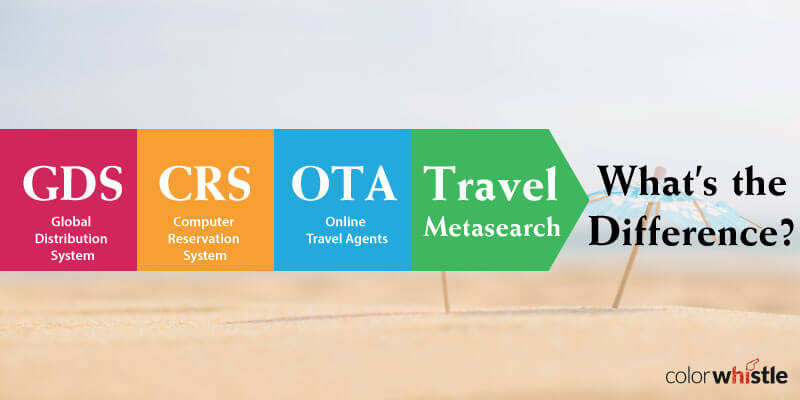Feeling overwhelmed by all the travel booking acronyms out there? Fear not! This blog is your guide to understanding the key variances between GDS, CRS, OTAs, and travel metasearch engines. Whether you’re in travel web development industry or a curious wanderer, understanding these terms will make your booking experience a whole lot smoother. Get set to uncover the differences between GDS vs CRS and OTA vs travel metasearch engines!
1. GDS (Global Distribution System)
A global distribution system is a huge database that stores and updates enormous information about inventory and hotel rates to travel agents and travel websites. This system is responsible for the extensive growth of the travel industry and was the stepping stone of most internet-based travel services.
Through this system, travel agents/agencies can access real-time availability, price, and offers of flight tickets, hotel rooms, rental cars, cruises, ferry reservations, trains, and other services. When compared to public rates, hotels sell their rooms 30% cheaper on GDS.
Global Distribution System (GDS) is a costly channel that mainly lets the sale of rooms in large numbers to big companies and travel agencies. So, small agencies don’t need GDS.
Also Read
Top GDS in the world
- Amadeus
- Travelport (Galileo, Apollo, Worldspan)
- Sabre
Did You Know?
The OTA market is expected to continue growing, with projections suggesting a market size of over USD 1 trillion by 2027
2. Computer Reservation System (CRS)
A Computer Reservation System (CRS) or central reservation system is an automated reservation that is used to store information, retrieve information and conduct transactions related to air travel. The system was originally designed to be used by airlines and was later extended for the use of travel agents. These days, it is also used to store and distribute information about tourism products or services to the public.
GDS and Computer Reservation System (CRS) have the same functions but, CRS only provides information about airlines. With GDS, you can reserve a ticket, book a room or rent a car. This is why they are known as Global Distribution System because you can reserve everything with GDS.
The term CRS is not much used as it became part of a bigger system known as the Passenger Service System (PSS) which comprises of CRS, an airline inventory system and the departure control system (DCS).
Examples of CRS
- Hewlett Packard’s EDS
- SabreSonic or Altéa (Sabre)
- Navitaire (owned by Amadeus)
Did You Know?
Computer Reservation Systems (CRS) Market Size Was Valued at USD 10.16 Billion in 2022, and is Projected to Reach USD 15.47 Billion by 2030, Growing at a CAGR of 5.4% From 2023-2030
3. Online Travel Agents (OTAs)
Online Travel Agents (OTAs) is a place where travelers can get access to a whole range of travel services such as accommodation, flights, travel packages, car rentals, tours and activities. Unlike travel metasearch engines, users can directly book through OTAs.
Travelers usually find these websites useful as they can easily compare rates, reviews, and availability of accommodation options at one glance. Any hotel can easily be listed on an OTA without any charge. They just have to add hotel photos, proper descriptions, rooms, rates, etc. Although appearing on an Online Travel Agencts (OTA) is free of charge, hotel owners have to pay a commission of 15%-20% when a booking is confirmed via an OTA.
Most of the OTAs make a huge investment in online marketing. So, we recommend hotels to have a presence in OTAs as they amplify the chance of reaching potential travelers locally and from around the world.
Did You Know?
In a scenario where prices are identical on hotel websites and OTAs, 70% of respondents said they would book via an OTA
Top 5 OTAs
- Expedia
- Priceline
- Orbitz
- Travelocity
- Yahoo! Travel
Did You Know?
61% of travelers visited an OTA before making a booking on a hotel site
4. Travel Metasearch Engines
A metasearch engine is a tool that aggregates date from other search engines and produces results to the user. In the travel industry, the metasearch engines aggregate rates and availability of hotels from different sources mainly from OTAs and sometimes directly from hotels. This makes things quite easy for users. All they have to do is find the type of hotel they want, enter their journey dates and compare the different options.
Metasearch engines do not do the actual booking; they just list the price and availability. When you select a particular hotel, you will be redirected to the OTA in which the fare was displayed to make the actual booking.
As far as the business model goes, travel metasearch engines earn revenue through completed transaction referred through the search engine. It also earns money by placing ads for travel agencies through CPC (cost per click) or CPI (cost per impression) model.
Also Read
Famous Metasearch engines
- Trivago
- Kayak
- Skyscanner
- TripAdvisor
- Google (with Google Hotel Finder)
Did You Know?
According to a survey, 44% of respondents “always used metasearch tools“, 73% “did so regularly”, and 94% were “at least occasional users”
5. Sharing Economy Platforms
Sharing economy platforms is a type of OTA which carters for apartments/holiday home rentals, small single property operators and large groups. It is a perfect solution for those who want to save money when traveling.
Many travelers prefer to stay on a shared basis as they are cheaper than commercial space like hotels, more personalized and give travelers an opportunity to live in local neighborhoods. This accommodation sector is a new way which solves the short and longer stay needs.
Examples of sharing economy platforms
- Airbnb
- Stayz
- HomeAway
- Flipkey
- Travelling Frogs
- Aura
- Tripping
Drive Conversions and Boost your Business with Expert Travel Website Development.
Keep your Travel Business Moving Forward via These Channels
More than ever, travelers are using the internet to plan their getaway. Therefore, every business linked with travel must work towards establishing a strong online presence.
Travelers type in many search terms and go through several websites to book their accommodation. So, if your name pops-up frequently, there is a 90% chance of receiving more bookings.
The world of traveling is changing quickly. Knowing what is going on in the industry will put you in a position to make better decisions.
Make use of the channels mentioned in this blog to grow your direct sales.
Which channel are you using to grow your travel business? Do share them in the comments section below.
In quest of the Perfect Travel Tech Solutions Buddy?
Be unrestricted to click the other trendy writes under this title that suits your needs the best!






I love you Anjana.
I needed such clarification since I want to take specific courses in Galileo and Amadeus.